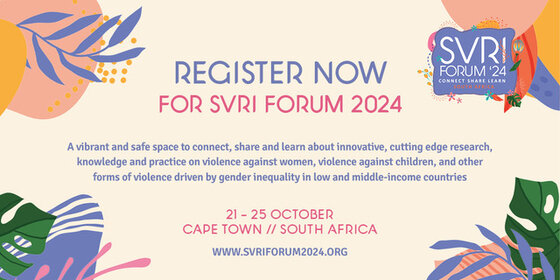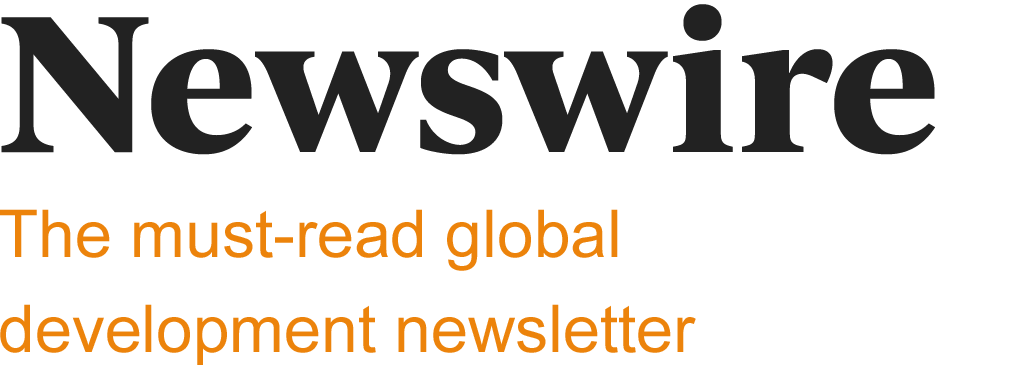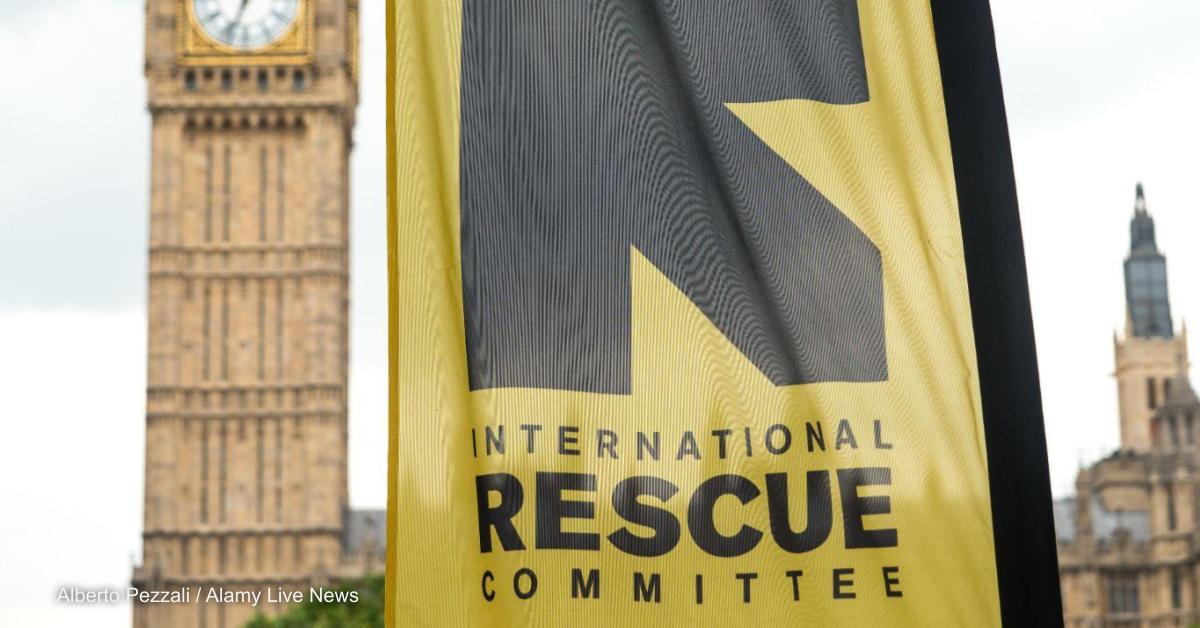|
Mpox is officially a public health emergency in Africa.
|
|
|
|
If your company was facing layoffs, how would you feel about the CEO’s sky-high salary? Ask the London office of the International Rescue Committee. Also in today’s edition: Africa CDC has declared mpox a public health emergency, and the European Commission is facing questions over alleged suppression of a research center's human rights study. 
|
|
Ka-ching!
When jobs are on the line, soaring executive pay does not go down well anywhere. David Miliband, president and CEO of the International Rescue Committee, earned a rather comfortable $1.25 million in 2023, making him the third highest-paid CEO among the 50 largest U.S. international NGOs.
But IRC's U.K. office is now facing down significant layoffs, with Devex U.K. Correspondent Rob Merrick exclusively reporting that 1 in 9 jobs there are at risk due to a budget crisis that has sparked allegations of "mismanagement" by leadership. Twenty-nine of the 261 positions in London are potentially affected by a growing deficit in unrestricted funding, with similar cuts expected across the INGO’s global operations. Miliband acknowledged internal failures as a contributing factor, noting that the organization’s systems have struggled to keep pace with its rapid growth. This admission has fueled staff frustration, with many blaming Miliband and the global leadership board for the crisis, Rob writes. Adding to the discontent is the perception that IRC has avoided taking a strong stance on the humanitarian crisis in Gaza, fearing it might alienate donors. This reluctance, coupled with the poorly managed communication around potential layoffs, has intensified anger among staff. The organization has assured that no job losses will occur until a consultation process is complete, and that programs funded by restricted grants will remain unaffected. However, the situation has left staff anxious and critical of how leadership has handled the budget crisis. ICYMI, download the report: The 50 largest US INGOs — and where they get their money |
|
A message from SVRI
 Learn more about SVRI Forum 2024 The 2024 forum is SVRI’s eighth global conference marking 21 years of service to the prevention of violence against women, or VAW, and violence against children, or VAC, and other forms of violence driven by gender inequality. Over 350 presentations across a range of formats and media will showcase the latest scientific developments and innovations in the field. |
|
It’s official
The African continent is grappling with an alarming rise in mpox cases, which has been spreading to countries previously untouched by the disease. In response, Dr. Jean Kaseya, director-general of the Africa Centres for Disease Control and Prevention, has declared the disease a public health emergency of continental security, emphasizing that this is a call to action, not a mere formality.
The outbreak is largely concentrated in the Democratic Republic of Congo, which accounts for over 90% of cases, but the disease has spread to 16 countries, including Burundi, Kenya, Rwanda, and Uganda, with more than 14,000 cases and 511 deaths reported. Kaseya highlights the urgency of being proactive rather than reactive, stressing the need for a coordinated global response to mitigate the threat and protect public health. Africa CDC is finalizing a joint response plan, and the World Health Organization is considering whether to declare the outbreak an international emergency, Devex Senior Reporter Sara Jerving writes. WHO has expressed concerns about potential overlap with Africa CDC's emergency declaration, but Kaseya insists that regional cooperation is essential to contain the spread. This is the first time Africa CDC has declared a public health emergency, a move supported by wide-ranging consultations and an Emergency Consultative Group recommendation. Despite the African Union's recent approval of $10.4 million for the response, Kaseya warns that $4 billion is needed and urges global partners to provide the necessary support. The continent faces significant challenges, including limited vaccine access, with only 200,000 doses available against a need for 10 million. Negotiations with WHO and other partners are ongoing, but the situation is dire, particularly in the DRC, where a new mpox variant has caused a surge in cases and fatalities — and is affecting children more severely than adults. Experts emphasize the need for increased surveillance, contact tracing, and community engagement to stop the spread. Kaseya cautions against actions such as border closures and travel restrictions, calling instead for global cooperation. “We need your support,” he says. “We need your expertise. We need your solidarity.” Read: Africa CDC declares mpox a public health emergency |
|
Looming deadline
The 2025 deadline for USAID to allocate 25% of its funding to local partners is coming up fast, but reaching that goal seems increasingly challenging — to put it mildly. According to USAID’s latest report, only 6.6% of its total $38 billion assistance and acquisition budget was directed toward local recipients in 2023, falling significantly short of its target.
While the definition of what local entails or how it should be measured varies among organizations that track USAID’s progress, Devex data analyst Miguel Antonio Tamonan says in any case it would take a Herculean effort for the agency to meet the goal. In 2023, USAID put up $6.8 billion through contracts, a 9.5% increase from the previous year. But the amount going to local contractors dropped by nearly 25%, representing just 3.2% of the total obligations. While funding to low- and middle-income country-based suppliers for activities abroad increased, most of the $6.5 billion still went to U.S.-based contractors. The distribution of local contracts reveals disparities: Suppliers from low-income countries received $112.4 million, a 12.5% increase, while those from lower-middle-income and upper-middle-income countries saw significant reductions. Interactive: Who won USAID’s local contracts in 2023? |
|
|
|
Sponsored by Boehringer Ingelheim
Opinion: How can we address the mental health crisis?
Supporting better mental health is central to achieving many of the United Nations 2030 Sustainable Development Goals. So, how can policymakers take action and start delivering on their commitments? |
|
And the banned played on
This is definitely not a good look: The European Commission is facing fire for suppressing a critical study on democracy and human rights in Guinea-Bissau, raising concerns of favoritism toward the country’s authoritarian leader.
The European Ombudsman has launched a rare investigation into the commission's actions after Paraguay-based research center DEMOS accused the EU of censoring its work, "Voices of the People," which was commissioned by Brussels. Despite the study's findings of “widespread mistrust” in Guinea-Bissau's government, the commission blocked its publication, prompting outcry from some 500 academics, journalists, and civic leaders across 45 countries. The critics have condemned the EU’s actions as an infringement on academic freedom and are demanding that all restrictions on the book be lifted. The ombudsman has set a mid-September deadline for the commission to justify its actions, writes Rob exclusively. “The EU has behaved like a giant bully,” Miguel Carter, director of DEMOS, tells Rob. “We signed a contract that guaranteed publication, and every lawyer we have seen has said we have a right to publish, but the EU has trampled all over us and banned sales.” Despite the commission's eventual authorization to publish the book, it banned sales, effectively stifling its distribution. Currently, the book is available only in a limited digital format, with just 300 physical copies produced — and “sitting in [Carter’s] house in Paraguay.” |
|
A message from SVRI
Register now for SVRI Forum 2024, Oct. 21-25, Cape Town, SA
Don’t miss the world’s largest conference dedicated to research on prevention of and response to violence against women, or VAW, and violence against children, or VAC, in all their diversity, and other forms of violence driven by gender inequality in low- and middle-income countries. A vibrant, informative, and safe space for researchers, practitioners, policymakers, donors, survivors and others to share and learn about developments and innovations in the sexual violence prevention field. This year’s themes cover VAW and VAC in their multiple forms; childhood sexual violence; integrating mental health, self-care, and collective care in research; and more. |
|
In other news
Aid groups warned that Afghanistan may become a “forgotten crisis” without continued international support, particularly endangering Afghan women and girls. [VOA] Houthi rebels raided the U.N. Human Rights Office in Sanaa, Yemen, confiscating documents and assets, according to a senior U.N. official. [AP] UNICEF warned that children born today will face twice as many extreme heat days as their grandparents, endangering nearly half a billion young people worldwide. [Bloomberg] 
|
|
Thank you for reading today’s Newswire, edited by Fiona Zublin, copy edited by Nicole Tablizo, and produced by Patricia Esguerra. Have a news tip? Email [email protected].
Forwarded by a friend?
Sign up here to receive the Newswire directly.
|
|
Devex thanks our partners for supporting our newsletters.
Our editorial content remains independent. Interested in partnering with us? Get in touch. |
|
Connect with us:
|






